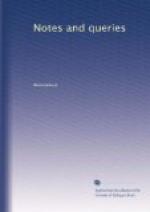Minar’s Books of Antiquities (Vol. i., p. 277.).—A.N. inquires who is intended by Cusa in his book De Docta Ignorantia, cap. vii., where he quotes “Minar in his Books of Antiquities.” Upon looking into the passage referred to, I remembered the following observation by a learned writer now living, which will doubtless guide your correspondent to the author intended:—
“On the subject of the imperfect views concerning the Deity, entertained by the ancient philosophical sects, I would especially refer to that most able and elaborate investigation of them, Meiner’s very interesting tract, De Vero Deo.”—(An Elementary Course of Theological Lectures, delivered in Bristol College, 1831-1833, by the Rev. W.D. Conybeare, now the Very Rev. the Dean of Llandaff. )
A.N. will not be surprised at Cusa Using the term “antiquitates” instead of “De Vero Deo,” if he will compare his expressions on the same subject in his book De Venatione Sapientiae, e.g.:—
“Vides nunc aeternum
illud antiquissimum in eo campo (scilicet non
aliud) dulcissima venatione
quaeri posse. Attingis enim antiquissimum
trinum et unum.”—Cap.
xiv.
T.J.
Smoke Money (Vol. ii., pp. 120. 174.).—Sir Roger Twisden (Historical Vindication of the Church of England, chap. iv. p. 77.) observes—
“King Henry, 1533/4, took them (Peter’s pence) so absolutely away, as though Queen Mary repealed that Act, and Paulus Quartus dealt earnestly with her agents in Rome for restoring the use of them, yet I cannot find that they were ever gathered and sent thither during her time but where some monasteries did answer them to the Pope, and did therefore collect the tax, that in process of time became, as by custom, paid to that house which being after derived to the crown, and from thence, by grant, to others, with as ample {345} profits as the religious persons did possess them, I conceive they are to this day paid as an appendant to the said manors, by the name of Smoke Money.
J.B.
Smoke Money (Vol. ii., pp. 120, 269.).—I do not know whether any additional information on smoke money is required but the following extracts may be interesting to your Querist:—
“At this daie the Bp. of Elie hath out of everie parish in Cambridgeshire a certeine tribute called Elie Farthings, or Smoke Farthings, which the church-wardens do levie, according to the number of houses or else of chimneys that be in a parish.”—MSS, Baker, xxix. 326.
The date of this impost is given in the next extract:—
“By the records of the Church of Elie, it appears that in the year 1154, every person who kept a fire in the several parishes within that diocese was obliged to pay one farthing yearly to the altar of S. Peter, in the same cathedral.”—MSS. Bowtell, Downing Coll. Library.
This tax was paid in 1516, but how much later I cannot say.




